Our School
The Tom Johnson music school is intended for beginners of all ages and backgrounds as well as for experienced musicians; it regularly invites lecturers and performers from all over France, but also offers cultural actions in our whole region, including in rural areas.
At first glance, there’s hardly anything unusual about the humble-sized music school that our association has been maintaining since the fall of 2022: weekly sessions, instrument classes, collective workshops, and many cultural events, mainly concerts and masterclasses. All of these are meant towards people of all generations and proficiency levels, including beginners (both adults and children).
For those in search of something more, our approach offers some rather unique teachings and methods.
Learning through creative and recreational activities
Express ourself by creating your own music! Improvisation or writing games help you grasp some techniques and musical rules, that you are invited to make your own.
An emphasis on performance arts
Engaging with the audience can be achieved through any language as long as it can convey structures and expressiveness: music, text, motion and gestures, to mention but a few. Separating these languages is, if anything, only arbitrary: for example, we warmly invite any musician to speak with the audience during their concerts, so as to explain and demystify the repertoire they’re playing and how they approach it.
In a similar line of thought, we have made it a point to welcome in our music school various performing arts: theater, clown, lyrical art (opera and others)… Not only do these artistic languages intertwine easily and gracefully with music, but they’re pursued through a very similar manner to music, involving rhythm, expressiveness, intelligibility, interacting with the audience,…
In this regard as in many others, we nurture Tom Johnson’s legacy (see below): like many avant-garde artists of his generation, his work was nearly always focused on the blending of music with theater, dance, circus arts. Many of his works even forego the very notion of music instruments or singing altogether, instead entailing spoken voice, motion in space, juggling,…
Freedom and responsibility in your own learning
Our belief is that anyone should have the option of starting to learn music and art, or to improve their artistic knowledge. Therefore, we offer a first session entirely free of charge, non-binding and without any prerequisite.
If and when you wish to commit to a course, you decide of your individual teaching sessions’ duration, ranging from thirty minutes to an hour.
Moreover, you can decide for yourself as to the number and frequency of your teaching sessions, by using our rather unique voucher system, whereby you can plan a given number of sessions as often and as regularly as you want for up to a year. That way, only you are in charge of the assiduity and regularity in your curriculum.
Our French-American identity
Although our school is located in rural France and classes are usually taught in French, a rather strong English, and more specifically North-American, influence is perceivable in the repertoire we tend to teach (contemporary music, jazz and pop music, but also our thriving musical theater workshops), as well as in the fact that most people in charge of teaching here are fully bilingual.Tom Johnson and minimalist music
Composers in the 20th century have had to cope with the upheaval of previously established artistic languages and structures; rather than being part of a pre-existing school, most of them had to come up with a language of their own, as well as their own manner of organising pitches, rhythms and timbres. Where many have opted for ever-increasing complexity (and in that process making themselves hardly accessible to both the audience and the music students), a trend amog some American composers starting from the 1960s was on the contrary to explore music in its most simple and fundamental components, most often in deliberate and repetitive structures.
 Tom Johnson (1939-2024) found himself at the heart of that movement, that he himself dubbed
"minimalist" music (as a writer for the New-York magazine The Village Voice).
A former student of Allen Forte and Morton Feldman, a close friend to John Cage
and Teeny Duchamp, an acquaintance of Philip Glass, Phil Niblock, Éliane Radigue
and many others, wedded to artist Esther Ferrer (from the Fluxus collective),
Tom Johnson has himself become one of the most prominent voices of the so-called "New Music".
Tom Johnson (1939-2024) found himself at the heart of that movement, that he himself dubbed
"minimalist" music (as a writer for the New-York magazine The Village Voice).
A former student of Allen Forte and Morton Feldman, a close friend to John Cage
and Teeny Duchamp, an acquaintance of Philip Glass, Phil Niblock, Éliane Radigue
and many others, wedded to artist Esther Ferrer (from the Fluxus collective),
Tom Johnson has himself become one of the most prominent voices of the so-called "New Music".
Through his own musical output (such as his 1972 Four Note Opera), he endeavoured to push minimalist aesthetic to an extreme —and very personal— level of purity and abstraction. Thus, from the late 1980s after moving to Paris, his music became nearly entirely ruled by logical and mathematical principles, thereby evading (or masking) the inevitable arbitrary choices that composing implies.
 There does remain, however, a constant playfulness to Tom Johnson’s style,
allowing him to engage in complicity with his performers and audience, with always
a healthy dose of good-natured humor. Rather than posing as an inapproachable author
who would be the sole bearer of transcendental inspiration, Tom makes it a point to
expose the inner workings of his compositional devices, gently guiding us to reach
a full, demystified understanding of musical systems. That purpose transpires
not only through the countless jokes that his score always come with, but also
through numerous explanation notes and didactical books that he wrote.
There does remain, however, a constant playfulness to Tom Johnson’s style,
allowing him to engage in complicity with his performers and audience, with always
a healthy dose of good-natured humor. Rather than posing as an inapproachable author
who would be the sole bearer of transcendental inspiration, Tom makes it a point to
expose the inner workings of his compositional devices, gently guiding us to reach
a full, demystified understanding of musical systems. That purpose transpires
not only through the countless jokes that his score always come with, but also
through numerous explanation notes and didactical books that he wrote.
There isn’t any deep mystery to music. Music is logical, comsistent and within reach of our understanding. Isn’t that precisely what makes it beautiful?
Learn more about Tom Johnson and his music by visiting his publishing house’s website: editions75.com.